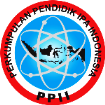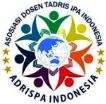Development of Teaching Materials Based on Scientific Argumentation on the Topic of Earth and Solar System
Abstract
Scientific argumentation plays a crucial role in fostering higher-order thinking and scientific literacy in science education. However, studies have shown that Indonesian students’ scientific argumentation skills remain low, while existing science textbooks generally reach only level 2 of argumentation quality. Consequently, these materials are not yet effective in facilitating the development of students’ argumentation competence. Furthermore, the topic of the Earth and the Solar System continues to generate misconceptions among students, highlighting the need for learning materials that integrate structured argumentation activities. This study, therefore, aims to develop science teaching materials based on scientific argumentation activities for the topic of the Earth and the Solar System. The research employed the Fuzzy Delphi Method, encompassing five key stages: (1) determining the model of scientific argumentation construction for developing argumentative texts, (2) defining learning indicators for material development, (3) designing teaching materials based on expert-validated indicators, (4) assessing the readability of the materials, and (5) validating the developed materials. The findings indicate that the resulting teaching materials are valid and appropriate for students’ cognitive levels. The materials were structured using a scientifically validated argumentation model and learning indicators categorized into cognitive levels of remembering, understanding, analyzing, and creating across five subtopics. Readability analysis using the Fry graph confirmed suitability for the target age group, while expert validation demonstrated high content and construct validity. These results suggest that the developed materials effectively support the integration of scientific argumentation in science learning, particularly on Earth and Solar System concepts.
Keywords: scientific argumentation, teaching materials, earth and solar system, fuzzy delphi method.Full Text:
PDFReferences
Anderson, L. W., & Krathwohl, D. R. (2001). A Taxonomy for Learning, Teaching, and Assessing: A Revision of Bloom’s Taxonomy of Educational Objectives. Longman.
Aryanti, D., Siswanto, S., Juliyanto, E., Trisnowati, E., & Amirul, M. A. (2024). Analysis of Science Textbooks from The Aspect of Scientific Argumentation: Comparing Several Books on The Topic of Heat. Journal of Natural Science and Integration, 7(1), 69-81.
Asri, A. S. (2017). Telaah Buku Teks Pegangan Guru dan Siswa Pada Mata Pelajaran Bahasa Indonesia Kelas VII Berbasis Kurikulum 2013. In RETORIKA: Jurnal Ilmu Bahasa (Vol. 3, Issue 1). http://ejournal.warmadewa.ac.id/index.php/jret
Azizah, V. N., & Budijastuti, W. (2020). The Relationship of Illustrative Content in Flipbook Type of E-Book As An Illustrative Learning Media In Immune System with Reading Test Results Using Fry Graphics. Berkala Ilmiah Pendidikan Biologi (BioEdu), 9(1), 109-114.
Bathgate, M., Crowell, A., Schunn, C., Cannady, M., & Dorph, R. (2015). The Learning Benefits of Being Willing and Able to Engage in Scientific Argumentation. International Journal of Science Education, 37(10), 1590–1612. https://doi.org/10.1080/09500693.2015.1045958
Berland, L. K., & Reiser, B. J. (2009). Making sense of argumentation and explanation. Science Education, 93(1), 26-55.
Chang, P. L., Hsu, C. W., & Chang, P. C. (2011). Fuzzy Delphi Method for Evaluating and Improving the Quality of Curriculum. International Journal of Fuzzy Systems, 13(2), 117-129.
Cohen, J. (1960). A Coefficient of Agreement For Nominal Scales. Psycological Measurement, 37–46.
Deane, P., & Song, Y. (2014). A Case Study in Principled Assessment Design: Designing Assessments To Measure and Support The Development of Argumentative Reading and Writing Skills. Psicología Educativa, 20(2), 99–108. https://doi.org/https://doi.org/10.1016/j.pse.2014.10.001
Erduran, S., & Park, W. (2023). Argumentation in physics education research: Recent trends and key themes. The international handbook of physics education research: Learning physics, 16-32.
Fatikhiah, F. Al. (2022). Analisis Buku Teks IPA SMP dari Aspek Scientific Explanation pada Materi Tekanan Zat. (Skripsi, Universitas Tidar).
Fry, E. (1968). A Readability Formula that Saves Time. Journal of Reading, 513–516.
Gray, R., & Kang, N. H. (2014). The Structure of Scientific Arguments by Secondary Science Teachers: Comparison of experimental and historical science topics. International Journal of Science Education, 36(1), 46–65. https://doi.org/10.1080/09500693.2012.715779
Guilfoyle, L., Hillier, J., & Fancourt, N. (2021). Students’ Argumentation In The Contexts Of Science, Religious Education, and Interdisciplinary Science-Religious Education Scenarios. Research in Science and Technological Education. https://doi.org/10.1080/02635143.2021.1947223
Hakim, A., Sahmadesti, I., & Hadisaputra, S. (2020). Promoting Students’ Argumentation Skill Through Development Science Teaching Materials Based on Guided Inquiry Models. In Journal of Physics: Conference Series (Vol. 1521, No. 4, p. 042117). IOP Publishing.
Heng, L. L., Surif, J., & Seng, C. H. (2015). Malaysian Students’ Scientific Argumentation: Do Groups Perform Better Than Individuals? International Journal of Science Education, 37(3), 505–528. https://doi.org/10.1080/09500693.2014.995147
Heriyanto. (2018). Thematic Analysis sebagai Metode Menganalisa Data untuk Penelitian Kualitatif. ANUVA, 2(3), 317–324.
Hidayati, P. P., Ahmad, A., & Inggriyani, F. (2018). Penggunaan Formula Grafik Fry untuk Menganalisis Keterbacaan Wacana Mahasiswa PGSD. Mimbar Sekolah Dasar, 5(2), 116. https://doi.org/10.17509/mimbar-sd.v5i2.11496
Hojjati, N., & Muniandy, B. (2014). The Effects of Font Type and Spacing of Text for Online Readability and Performance. In Contemporary Educational Technology (Vol. 5, Issue 2).
Kuhn, D., & Lerman, D. (2021). Yes But: Developing A Critical Stance Toward Evidence. International Journal of Science Education, 43(7), 1036–1053. https://doi.org/10.1080/09500693.2021.1897897
Kundariat, M., Maghfiroh, L., Indriwat, S. E., Rohman, F., & Priambodo, B. (2022). Revealing the Effect of Local-Based Teaching Materials toward Scientific Reasoning, Argumentation, and Problem-Solving in Biology Classroom. Journal of Biological Education Indonesia (Jurnal Pendidikan Biologi Indonesia), 8(3), 287-295.
Laamena, C. M., Nusantara, T., Irawan, E. B., & Muksar, M. (2018). Analysis of the Students’ Argumentation based on the level of Ability: Study on the Process of Mathematical Proof. Journal of Physics: Confere nce Series, 1028(1). https://doi.org/10.1088/1742-6596/1028/1/012156
Lazarou, D., & Erduran, S. (2021). “Evaluate What I Was Taught, Not What You Expected Me to Know”: Evaluating Students’ Arguments Based on Science Teachers’ Adaptations to Toulmin’s Argument Pattern. Journal of Science Teacher Education, 32(3), 306–324. https://doi.org/10.1080/1046560X.2020.1820663
Leonelli, S. (2015). What Counts as Scientific Data? A Relational Framework. Philosophy of Science, 82(5), 810–821. https://doi.org/10.1086/684083
Liu, Q. T., Liu, B. W., & Lin, Y. R. (2019). The Influence of Prior Knowledge and Collaborative Online Learning Environment on Students’ Argumentation in Descriptive and Theoretical Scientific Concept. International Journal of Science Education, 41(2), 165–187. https://doi.org/10.1080/09500693.2018.1545100
Maruti, E. S., Cahyono, B. E. H., Kurniawati, R. P., & Hanif, M. (2023). Do Javanese Textbooks Convey Relevant Material? Evidence of Readability and Value of Learning Outcomes. Preventing School Failure: Alternative Education for Children and Youth, 1–6. https://doi.org/10.1080/1045988X.2023.2181299
Noviyanti, D., Sutini, A., & Kurniawati, K. (2017). Pendekatan Komunikatif Interaktif untuk Meningkatkan Kosakata Anak Usia Dini. Cakrawala Dini, 8(1).
Nurdjan, S., Firman, & Mirnawati. (2016). Bahasa Indonesia untuk Perguruan Tinggi. Makassar: Penerbit Aksara Timur.
Osborne, J. (2010). Arguing to Learn in Science: The Role of Collaborative, Critical Discourse. Science, 328(5977), 463–466.
Plummer, J. D., Palma, C., Flarend, A., Rubin, K., Ong, Y. S., Botzer, B., McDonald, S., & Furman, T. (2015). Development of a Learning Progression for the Formation of the Solar System. International Journal of Science Education, 37(9), 1381–1401. https://doi.org/10.1080/09500693.2015.1036386
Postigo, Y., & López-Manjón, A. (2019). Images in biology: are instructional criteria used in textbook image design? International Journal of Science Education, 41(2), 210–229. https://doi.org/10.1080/09500693.2018.1548043
Rachmawati, S., Susanto, H., & Fianti, F. (2017). Penggunaan Metode CRI (Certainty Of Response Index) Berbantuan Soal PISA (Programme Of International Student Assesment) untuk Mengidentifikasi Miskonsepsi IPA Materi Tata Surya. UPEJ Unnes Physics Education Journal, 6(3), 26-31.
Saido, G. A. M., Siraj, S., DeWitt, D., & Al-Amedy, O. S. (2018). Development of An Instructional Model for Higher Order Thinking in Science Among Secondary School Students: A Fuzzy Delphi Approach. International Journal of Science Education, 40(8), 847–866. https://doi.org/10.1080/09500693.2018.1452307
Simon, S., Erduran, S., & Osborne, J. (2006). Learning To Teach Argumentation: Research and Development in The Science Classroom. International Journal of Science Education, 28(2–3), 235–260. https://doi.org/10.1080/09500690500336957
Siswanto, S., Anci, S. Y., Yusiran, Y., Hartono, H., Subali, B., & Trisnowati, E. (2020). Scientific or Not? Mapping Category of Students’ Written Argument. Proceedings of the 7th Mathematics, Science, and Computer Science Education International Seminar, MSCEIS 2019. https://doi.org/10.4108/eai.12-10-2019.2296492
Siswanto, S., Hartono, H., Subali, B., & Masturi, M. (2022). Infusing Explicit Argumentation in Science Reading Activities: Helping Prospective Science Teachers Reduce Misconception and Foster Argumentation Skills. Pegem Egitim ve Ogretim Dergisi, 12(3), 177–189. https://doi.org/10.47750/pegegog.12.03.19
Sumarni, S., Aryanti, D., & Siswanto. (2020). Pandangan Guru IPA tentang Nature of Science(NOS) dan Argumentasi Ilmiah Serta Kendala dalam Pengajarannya. Indonesian Journal of Natural Science Education (IJNSE), 3(2), 362438.
Textbook Committee. (2016). Guidling Principles for Quality Textbooks. Hongkong: Education Bureau.
Toulmin, S. (2003). The Uses of Argument, Updated Edition. Cambridge: University Press.
van Eemeren, F. H., Garssen, B., Krabbe, E. C. W., Snoeck Henkemans, A. F., Verheij, B., & Wagemans, J. H. M. (2014). Toulmin’s Model of Argumentation. In F. H. van Eemeren, B. Garssen, E. C. W. Krabbe, A. F. Snoeck Henkemans, B. Verheij, & J. H. M. Wagemans (Eds.), Handbook of Argumentation Theory (pp. 203–256). Springer Netherlands. https://doi.org/10.1007/978-90-481-9473-5_4
Zangori, L., Ke, L., Sadler, T. D., & Peel, A. (2020). Exploring primary students causal reasoning about ecosystems. International Journal of Science Education, 42(11), 1799–1817. https://doi.org/10.1080/09500693.2020.1783718
Zhang, J., & Browne, W. J. (2022). Exploring Chinese High School Students’ Performance and Perceptions of Scientific Argumentation by Understanding It as A Three-Component Progression of Competencies. Journal of Research in Science Teaching. https://doi.org/10.1002/tea.21819
DOI: http://dx.doi.org/10.24014/jnsi.v8i2.26428
Refbacks
- There are currently no refbacks.

Journal of Natural Science and Integration
E-ISSN: 2620-5092 P-ISSN: 2620-4967
Published By:
Department of Science Education, Faculty of Education and Teacher Training,
State Islamic University of Sultan Syarif Kasim Riau, Indonesia
Mailing Address:
Jl. H.R Soebrantas Km. 15 No. 155
Kelurahan Simpang Baru
Kecamatan Tuah Madani, Pekanbaru, Riau, Indonesia
Email: jnsi.tadrisipa@uin-suska.ac.id
Indexed By:
Journal of Natural Science and Integration is licensed under a Creative Commons Attribution 4.0 International License.


_-_Copyy2.png)






.jpg)
.png)
.jpg)
.jpg)




